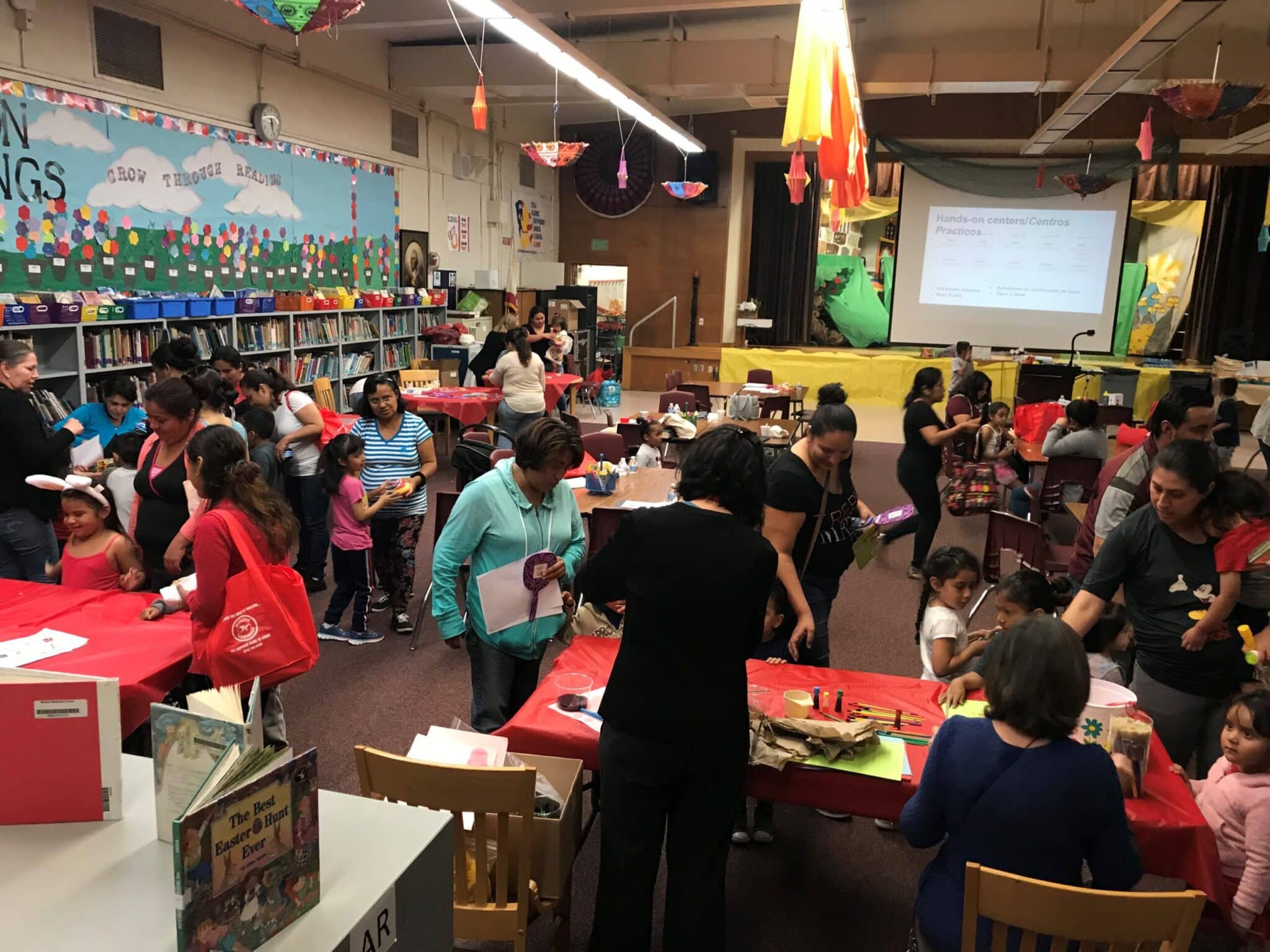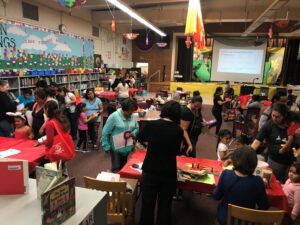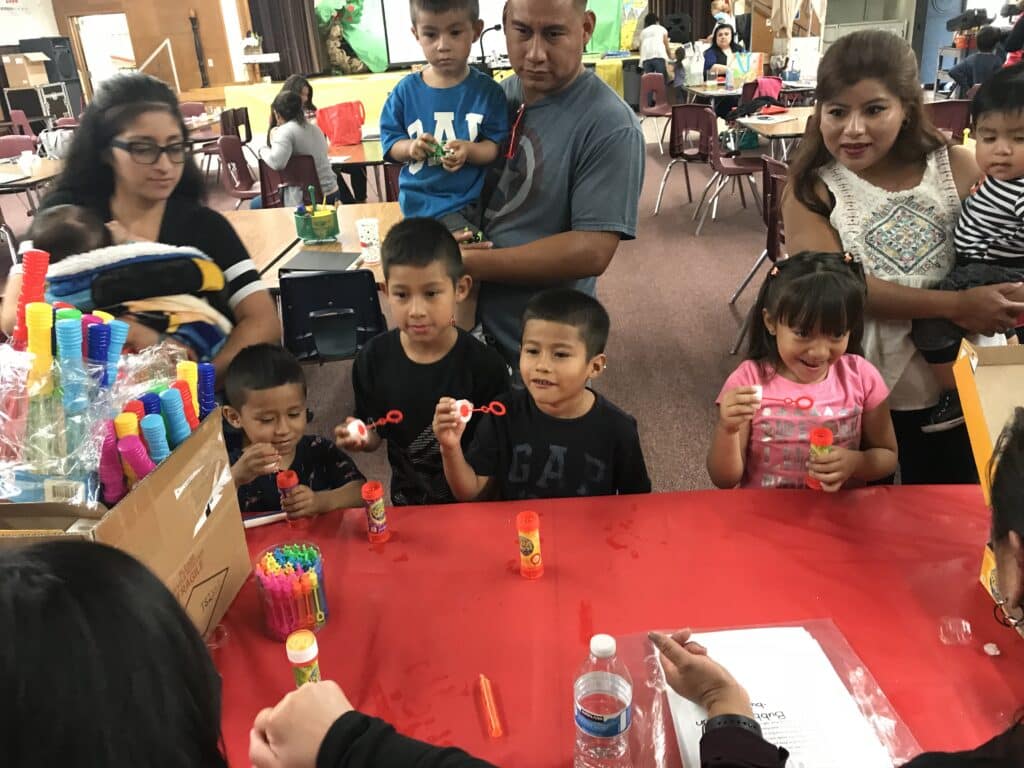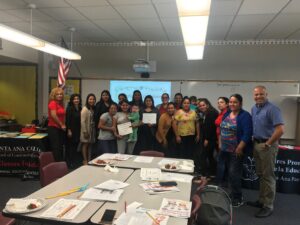Santa Ana Early Learning Initiative: Padres Poderosos/Powerful Parents
July 17, 2018
by

 According to the 2015 Census, in Santa Ana, there were 53,323 children ages nine years and younger (16 percent of the population), with 25,751 of them under the age of four. With those staggering numbers, multiple organizations (Delhi Center, El Sol Science and Arts Academy, and the Orange County Labor Federation) came together in 2015 to ask how they could create system and policy changes to support the economic needs of families with young children.
According to the 2015 Census, in Santa Ana, there were 53,323 children ages nine years and younger (16 percent of the population), with 25,751 of them under the age of four. With those staggering numbers, multiple organizations (Delhi Center, El Sol Science and Arts Academy, and the Orange County Labor Federation) came together in 2015 to ask how they could create system and policy changes to support the economic needs of families with young children.
The opportunity arose for the three organizations to partner with the Children and Families Commission and the Center for the Study of Social Policy after the release of a capacity building grant that focused on a Collective Impact Framework, while also addressing the need to improve early literacy. The grant used the Two-Generation Model approach to provide supports and services not only to children, but also to their parents. The model would help increase early literacy outcomes, while also strengthening parenting capacity and addressing the economic needs of these families.
Eventually, the initial partners grew into a larger stakeholder group that would include government agencies, nonprofits, and the business community. The collaborative group, initially called the Early Literacy Initiative, changed the name to the Santa Ana Early Learning Initiative (SAELI).
Since 2015, SAELI has grown from three to over 50 partners that are focusing on two things:
1) Enhancing early learning outcomes for all children prenatal to nine years old in Santa Ana; and
2) Improving the economic well-being of their parents/caregivers.
When the Santa Ana Unified School District joined the group in the spring of 2017, the partners started looking at school aged children from preschool-to-fourth grade, and the many assessments used to measure their performance. The Children and Families Commission shared their Early Development Index (EDI) and United Way’s Family Financial Stability Index (FFSI) data to provide an insight into how children’s early literacy outcomes are affected by the economic instability of their families. What emerged was the need to target children at much younger ages.
SAELI knew that it would be challenging to take on the entire Santa Ana community, and instead decided to focus on three target neighborhoods. The three target neighborhoods chosen were: the Delhi Neighborhood, which includes Edison, Esqueda, Monroe and Washington elementary schools; Minnie Street neighborhood, which includes Madison and Kennedy elementary schools; and Pico-Lowell neighborhood, which includes Pio Pico, Lowell and Heninger elementary schools. Each of the principals from these schools committed to working on improving early learning and were tasked with developing a spark project that would help them target families with younger kids.
 It was evident to the SAELI partners that by targeting children ages 0 to 5—before they reached the formal school system—they would have a higher chance of succeeding by the time they entered school. For this reason, the SAELI schools—along with the support from the school district’s early education curriculum specialists and other SAELI partners—created a training program for families with young children, in order to increase their awareness on the importance of early childhood education while also strengthening their parenting capacity. The result was Padres Poderosos/Powerful Parents. These 6 week, 90 minute workshops focused on a different topic every week, where parents/caregivers would learn about language development; early literacy; math/science/technology; health and social-emotional development; and school readiness. The goal was to teach the parents instructional activities for them to be working on at home with their children in order to better prepare them for school.
It was evident to the SAELI partners that by targeting children ages 0 to 5—before they reached the formal school system—they would have a higher chance of succeeding by the time they entered school. For this reason, the SAELI schools—along with the support from the school district’s early education curriculum specialists and other SAELI partners—created a training program for families with young children, in order to increase their awareness on the importance of early childhood education while also strengthening their parenting capacity. The result was Padres Poderosos/Powerful Parents. These 6 week, 90 minute workshops focused on a different topic every week, where parents/caregivers would learn about language development; early literacy; math/science/technology; health and social-emotional development; and school readiness. The goal was to teach the parents instructional activities for them to be working on at home with their children in order to better prepare them for school.
The design of the Padres Poderosos/Powerful Parents trainings incorporate three components: parent education on early learning, parent and children interactive play in activity stations, and a chance to connect with resources from the community. For the first 30 minutes, the children are taken to play while the parents learn about important developmental milestones and activities to help their children develop the skills necessary to be school-ready. After the training session for the parents, the children are brought back and they go from one activity station to another, where the parents and children interact together.
The principals, along with the help of their preschool and kinder teachers, provide the training and work alongside the parents and children in the activity stations. The activities include putting together puzzles, cutting out patterns by using scissors (teaching kids how to properly hold and use scissors), relay and obstacle courses to teach kids how to use their gross motor skills, and activities in which children use their language skills to sing songs and help identify letters, numbers, and colors. The materials used for the training and for the activity stations are all tools that families can continue to work on with their kids, at home. The principal at Madison, Lisa Gonzales-Soloman, emphasized to the parents the importance of continuing this work at home; parents later sent photos of themselves and their kids working on the activities they had learned at the training.
A portion of the time is dedicated to SAELI partners to share with the parents/caregivers about the supports and services available to them in their neighborhood. The SAELI partners gave a presentation on what they offered, and had a table with flyers, giving the parents time to come and learn about the available resources in their community.
Parents and caregivers with younger children—who aren’t already enrolled in school—were provided the opportunity to familiarize themselves and their kids with the school setting. All families were equipped with the knowledge to help continue the education process at home, strengthening not only the capacity of the children but also by increasing the parenting capacity of the parents.
“Padres Poderosos has re-inspired me as an educator. I see the impact we can make and how we truly are helping the future.”
The engagement of the school staff with the parents fosters an environment for growth and development in parenting capacity. Parents also create stronger bonds with their children as they work through the activity tables, focusing on the key elements of development and school readiness. Principals and school staff administer an evaluation of the program at the end of each session, which serves to document the experiences of the parent participants. One parent at Madison Elementary stated, “I liked that I had a chance to spend quality time with my kids. It’s the first time I learned about a program like this, that incorporates academic things to do with the kids at home. I think it will help me be a better parent.” At the celebration ceremony at Lowell elementary, one mom said “I didn’t know that my 3 year old son was behind in development until the training on language development. I was so thankful to be connected to Help Me Grow, too, because now my son has been screened by a specialist they referred me to. I’m glad I came. I know I’m not the only parent who is probably experiencing something like this. Our community just doesn’t know about these things.”
The SAELI partners (schools and organizations) also mentioned having positive experiences. Principal Gonzales-Solomon said of the program: “Padres Poderosos has re-inspired me as an educator. I see the impact we can make and how we truly are helping the future.” A trainer from MOMS Orange County also recognized two parents that attended the classes he taught at one of the sites in Santa Ana and exclaimed, “It’s great seeing mom and dad active in the development of their kids!”
 The work that the SAELI partners do focuses on collective impact. Nonprofits, businesses, and —schools collaborate together to make positive changes in Santa Ana. The next steps for the group focus on parent engagement in the three target neighborhoods. By approaching parents/caregivers, residents and community leaders, SAELI hopes to weave another component into the collaborative group. The goal is to connect families and community members—with an interest in improving early learning outcomes and family economic stability—to more supports and services by activating a neighborhood leadership team that can serve as connectors to formal and informal supports and services. Padres Poderosos/Powerful Parents has been just one tool that is making this happen. It is evident that parents are emerging as more informed community members, and possibly as future leaders that can help improve the well-being of their neighborhood.
The work that the SAELI partners do focuses on collective impact. Nonprofits, businesses, and —schools collaborate together to make positive changes in Santa Ana. The next steps for the group focus on parent engagement in the three target neighborhoods. By approaching parents/caregivers, residents and community leaders, SAELI hopes to weave another component into the collaborative group. The goal is to connect families and community members—with an interest in improving early learning outcomes and family economic stability—to more supports and services by activating a neighborhood leadership team that can serve as connectors to formal and informal supports and services. Padres Poderosos/Powerful Parents has been just one tool that is making this happen. It is evident that parents are emerging as more informed community members, and possibly as future leaders that can help improve the well-being of their neighborhood.
—
Paola Padilla is a project coordinator with SAELI.


